Early days
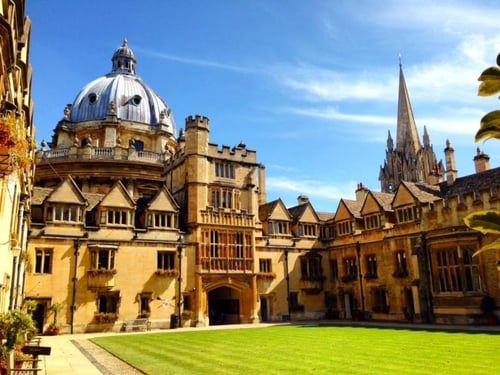 |
|
Brasenose College, Oxford
|
The origin of the Apollo Lodge, as it was called in the beginning, dates from a meeting held in Brasenose College on 24 May 1818 attended by George Hitchens, a surgeon aged 29, Worshipful Master of the Alfred Lodge No 649, Daniel Keyte Sandford, James Edmund Leslie, Lambert Blackwell Larking and William John St. Aubyn. Of these, Larking of Brasenose (BNC) was in the Chair and probably host. A member of the St Frederick Lodge, Boulogne, he was in his second year and just 21. Sandford, son of an Edinburgh physician, was of Christ Church aged 21. He was to become Professor of Greek at Glasgow, and Member of Parliament for Paisley in 1838. Leslie, a Belfast man, had matriculated at Christ Church that month at the age of 18. St Aubyn, a member of the well-known Cornish family, was 24, formerly of Christ Church, now of Worcester College. He was a member of the Loge L'Union des Coeurs, Geneva, in which the Duke of Kent had been initiated in 1790.
They resolved that:
We Brethren, free and accepted Masons, do form ourselves into a Lodge, and petition the Grand Master of England to grant us a charter for constituting the same;
The permission of the Vice-Chancellor of this University be first obtained;
In the case of this charter being granted, John Ireland be appointed Master; George Hitchings, Senior Warden; Sir Charles Macdonald Lockhard Bt, Junior Warden; David Keyte Sandford, Senior Deacon; James Edmund Leslie, Junior Deacon; William John St Aubyn, Inner Guard; The Rev. Joseph Bardgett, Chaplain; Stephen Wentworth, Treasurer; Hiram Holden, Tyler;
The Lodge be styled 'The Apollo Lodge of Free and Accepted Masons';
Its meetings to be held at the Star Inn until a more convenient place can be prepared exclusively for that purpose;
A medal be cast to be worn by each member suspended by a piece of blue riband, and be stamped on one side with an Apollo, surmounted with the motto 'aliusque et idem', and on the reverse with a temple guarded by two serpents and the motto 'sacer est locus', and the edge to be engraved with the motto 'Dominus illuminatio mea'.
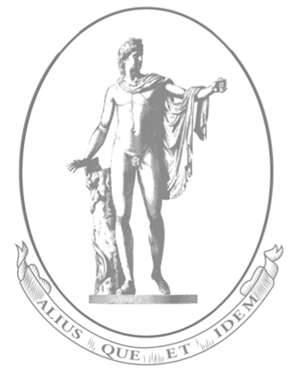 |
| The Apollo Belvedere |
John Ireland, Master-designate, then aged 71, was an apothecary. He had been initiated in 1773 in the then extinct Constitution Lodge No 396, of which he had been Master in 1780 and 1788. He became the first Master of the Alfred Lodge in 1814. And so began the happy masonic connection between the oldest surviving City Lodge and the University Lodge. The Junior Warden designate had matriculated from All Souls in 1795 and taken his degrees from Merton. He was then 43 years of age. The Treasurer was a pharmacist or surgeon in the city but a member of the University as 'privilegiatus' in 1808. He was aged 36, while the Tyler with the appropriate Christian name of Hiram was a printer in Oxford.
The same meeting produced a set of Laws and Regulations, among them being a decision to meet on the first and third Wednesday in every month during Term. The proposer of an Initiate had to deposit a guinea with the Secretary. If approved, the candidate could be initiated the same evening, and could not be initiated after six (subsequently changed to three) months had elapsed. A fee of two guineas was required of every brother before his Passing and Raising. The election of Master, Treasurer and Tyler was fixed for 2 November, when the Master would appoint his Wardens and other officers. The Junior Warden was specifically charged with the duty of looking after guests and of seeing that the tables were suitably supplied. Every visiting brother had to pay 10s 6d each visit. Supper was to be served as soon as Lodge closed, normally at 9 p.m. and brethren were to disperse by 11:30 p.m. A charity box was sent round at the end of every meeting.
At a further preliminary meeting, held in Brasenose College on 30 May 1818, it was resolved to apply to Grand Lodge for a Book of Constitutions. The Lodge was to subscribe one guinea annually to the Charity for Female Children and to the Institution for Clothing etc. the Sons of Indigent and Deceased Masons. Members were to wear evening dress with white gloves and medals and regular regalia.
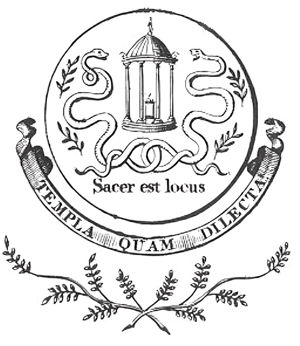 |
|
The reverse design of the Founders' Medal
|
On 19th February 1819 the Lodge was opened by William Thompson, the Master of the Alfred Lodge, assisted by the Wardens, Deacons, and Secretary of his Lodge. The minutes of the Preliminary Meetings were agreed and the Lodge opened in all three degrees. Bro. Thompson informed the Lodge that he had the previous evening tendered the obligation as Master to Bro. Ireland, who was unable to attend, and who had appointed him his locum tenens. Bro. Thompson then read the warrant of the Grand Master and proclaimed the Apollo Lodge No 711 to be duly authorised, and installed the officers. The Lodge was resumed in the first degree when Bro. Case was duly initiated. A vote of thanks was passed to Bro. Larking for the zealous conduct he had displayed, as well as to the Master and officers of the Alfred Lodge. Two gentlemen from Merton, one from St Mary Hall, and one from Worcester College were accepted for Initiation. The lecture in the First Degree was given for the instruction of Bro. Case. The Lodge was closed and reopened after supper and then finally closed after an evening of harmony and brotherly love.
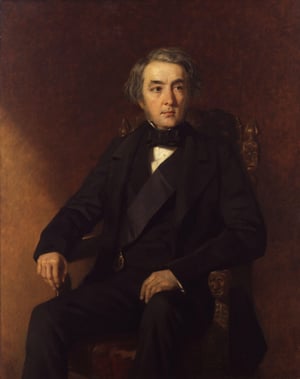 |
| Francis Egerton, 1st Earl of Ellesmere |
Between its formal constitution and the beginning of the long vacation the Lodge met no less than eleven times. Twenty-three gentlemen were initiated from eight colleges. Christ Church provided seven including Lord William Cholmondeley, Lord Francis Leveson-Gower (later Earl of Ellesmere) and Lord Dunglass. Two waiters of the Star Inn were also initiated. Twelve Brethren were passed and twelve were raised. Several Brethren became joining members, including Bro. William Marshall, described in the minutes as Professor of Music. He had been admitted as a member of the University in 1812 as a 'privilegiatus' and as a 'musicae supellectilis venditor'.
During the early months of its existence the Lodge passed and raised its new initiates long before the statutory month had elapsed between the ceremonies. On 5 May 1819, Lambert Larking, the Junior Warden, informed the Lodge that he had been at the Grand Festival in London where he had learnt from the Grand Secretary that the Lodge had been acting against the Constitutions in passing and raising several brethren too speedily and that consequently its members were liable to be summoned before the Board of General Purposes and the Lodge to be erased. The Lodge decided to petition Grand Lodge for their forgiveness. They pleaded that when the Lodge was constituted, the Book of Constitutions was being revised and therefore they had no copy. They expressed their great regret at having, as inexperienced masons, acted improperly and affirmed their intention of doing nothing contrary to established usages. They further stated that the University's laws would prevent them from obeying a summons to appear in London during term. At the same time they petitioned the Grand Master for a dispensation to initiate gentlemen under 21 years of age. They stated that those proposed would have been of the highest value to the craft owing both to their character and rank. Among them were, as mentioned above, Lord William Henry Hugh Cholmondeley, Lord Francis Leveson-Gower (later Francis Egerton, 1st Earl of Ellesmere), Lord Dunglass, Lord Ashley, the Hon. Henry Upton and other noblemen and gentlemen of high rank whose stay in the University was short, and who generally left the country to visit foreign kingdoms. They asked the Grand Master to give them standing leave to initiate minors or at least from time to time indulge the Lodge in this respect. There is no record of any reply from Grand Lodge either in the Minutes of the Apollo or in the letter books of Grand Lodge. Suffice it to say that the Lodge carried on in a more regular manner and several times asked and obtained dispensations to initiate gentlemen under age.
Other matters that were decided in this period were an increase in initiation fees to 5 guineas, and a membership fee for those who had left Oxford of one guinea a year. It was agreed to hold two Festivals each year on 2 November and 19 February and it was ordered that if an officer were not present at the opening of the Lodge, his substitute should continue to act during the whole evening. On 5 May, the Worshipful Master – the elder statesman of Oxford Masonry, Bro. John Ireland – gave a short lecture with regard to behaviour outside the Lodge, warning the Brethren to be particularly cautious in all their conduct. Bro. Thompson of the Alfred Lodge had been a constant visitor and to mark their appreciation of his services the Lodge presented him in June 1819 with a jewel. Bro. Larking was likewise thanked for his indefatigable zeal in promoting the interest of the Lodge.
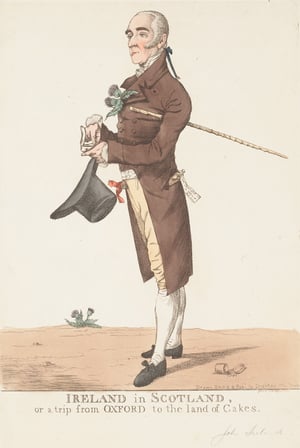 |
| John Ireland, Primus Master of the Apollo |
Between the beginning of 1820 and Trinity Term 1825, the Lodge initiated 79 Brethren, among whom were Lord Harley, Sir St Vincent Cotton, 6th Bt, Randolph, Lord Garlies, 2nd Earl of Clanricarde, the Hon. Francis Curzon, the Hon. William Brabazon, the Hon. Charles Bathurst, all of Christ Church, and the Hon. Miles Stapleton, of Worcester. The Lodge had members from Brasenose, Balliol, Worcester, Trinity, St. Mary's Hall, Jesus, Corpus, Oriel, University – of which those from Brasenose were the most numerous. In February 1820 the Lodge agreed to meet once a month only in term unless there were at least three candidates ready for initiation. In February also letters of condolence were sent on the deaths of George II and of the Duke of Kent and a letter of congratulation to George IV on his accession. In November 1820 it was agreed to donate six guineas annually to the Radcliffe Infirmary and one guinea to a distressed Spanish Brother while 3 guineas were voted to Bro. Meek, the waiter of the Star Inn for his distressed family, while in the following year ten guineas were granted to the Masonic Orphans Charities in London and 5 guineas to the mendicity society in Oxford and 10 guineas to the lunatic asylum.
In March 1821, it was proposed 'that application should be made for dispensations to admit such individuals, members of the University under the full age of 21 years as the Lodge might deem worthy', by a separate application in each case. Two years later the Lodge asked the Provincial Grand Master for general dispensation for initiating candidates under 21. On 18 February 1822, Edward Ogle, who had been initiated on 10 March 1819 at the age of 21 and who had served as Secretary the previous year, was elected Master – the first since Ireland. At the Festival held the following day, there were present 21 Brethren and 8 visitors when the 'Brethren proceeded in grand procession to Dinner. The Lodge was closed after the Evening had been spent in the most perfect Masonic harmony'. It is noteworthy that at this time the dinners were always held when the Lodge was open.
At the subsequent meeting, a vote of thanks was passed to Bro. Ireland for his long and valuable services and for the dignified and impartial manner in which he had conducted the business, and that he be considered as Honorary Member and invited to all Lodge meetings. Another interesting Honorary Member, who, however, was expected to pay the Lodge a guinea a year was Dr Aranatti, described as a Professor of Modern Languages, and a member of 'a foreign lodge', elected in April 1823. In February 1824 Bro. The Rev. Charles Ridley of University College was elected and installed as Master. He had been initiated at the end of 1820 at the age of 30, was J.W. in 1822 and S.W. the following year. He was succeeded in 1825 by the Rev. L.J. Watling of Jesus, initiated in March 1823 at the age of 30. He had been Senior Warden the previous year.
1825-1869
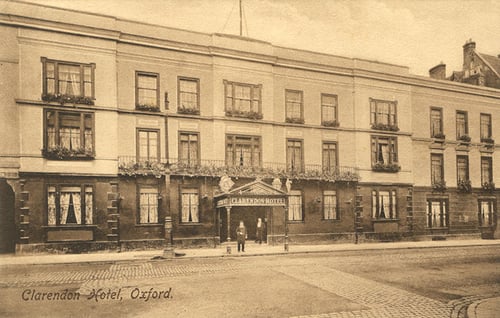 |
| The Clarendon Hotel, c. 1905 |
In 1829, the Lodge moved from its original home in the Star Inn to the Angel, near the present Examination Schools, but three years later the Apollo had joined the Alfred in establishing purely Masonic premises in Alfred Street, off the High. Two years later, a joint committee of the two Lodges was set up for the purchase of an organ. Bro. Morell of the Alfred presented a handsome organist's jewel with collar and appendages. The organ had to be repaired on numerous occasions until Bro. Beach of Apollo presented a new instrument in 1856. For nearly twenty years the two Lodges seemed to have worked in harmony until April 1864 when the Clerk to the Masonic Hall shareholders wrote to say that their other tenants – the Alfred and Churchill Lodges and the Chapter and Encampment – kept strictly to the terms of their tenancy and in total used the building less often than did Apollo. Accordingly, unless changes of an important character were to be made, the tenancy of Apollo must cease. The Lodge at once accepted this 'request'. The result was the erection in Frewin Court at the back of the Clarendon Hotel of a new Lodge room, which, the minutes inform us, was consecrated by the Provincial Grand Master in February 1865 in time for the 47th anniversary Festival at which 137 Brethren dined. These premises, on lease from the Clarendon Hotel, remained the home of the Lodge until shortly after the First World War.
Until the appointment of Lord Henry John Spencer-Churchill as Provincial Grand Master in 1836, installed as such the following year, the Lodge minutes give no indication of the presence of a Provincial Grand Master, although that office was held by Lord Forbes. But early in 1837, two communications were received from Lord John, one desiring that the practice of cheering after Masonic fire might be discontinued and the other calling attention to the article in the Book of Constitutions requiring a dispensation for every individual wishing to be initiated under age. Actually only five gentlemen under 21 years of age had been initiated between the foundation of the Lodge and 1833, but research has revealed that the true number was a good deal greater, with no less than 49 with aristocratic connections.
The Provincial Grand Master was present at the Festival held in 1838. On that occasion, twelve members of the Lodge were present with the Provincial Grand Master, the Grand Secretary White, 14 members of the Alfred, two of the 'Reading Lodge' and four from the Foundation Lodge, Cheltenham. Four gentlemen were proposed and seconded, while Sir Robert Brownrigg, 2nd Bt, of Christ Church was initiated. After the ceremony the Lodge was (as usual) called from labour to refreshment when the Anniversary was celebrated by the Brethren present. After dinner the Lodge was closed in due form. On that day Lord John appointed W. Bro. Charles John Ridley his Deputy. He had been one of Apollo's early Initiates and was a Fellow of University College. On the death of Lord John on active service in the China war of 1840, Ridley continued as Deputy, serving under the Grand Registrar in charge of the Province, until his appointment in 1841 as Provincial Grand Master. He thus became the first in a long line of members of Apollo to be placed at the head of a Province. The Lodge presented him with his Chain of Office.
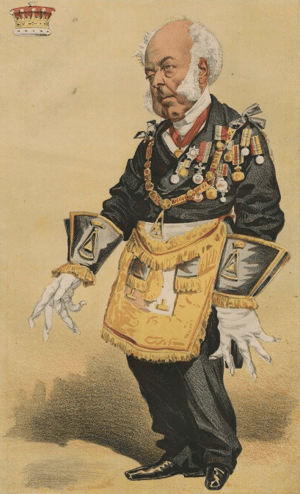 |
| 2nd Earl of Zetland, Grand Master 1844-1870 |
From time to time, the Lodge took note of events in Grand Lodge. Thus in 1845, a communication was read from the Humber Lodge in Hull objecting to alterations proposed in the amount to be paid by Lodges to the Fund of Benevolence. The Lodge agreed to petition Grand Lodge against the proposal. In 1858 the Lodge expressed its sympathy with the Grand Master under the groundless and libellous attack on him in the Masonic Observer. The Grand Master, Lord Zetland, in thanking Apollo for the address voted to him stated that 'such a Testimony of approbation of my Brethren must at all times be most gratifying, but it is still more highly appreciated coming from so distinguished a Body as the members of the Apollo Lodge'. In the same year the Lodge signified its approval of a scheme for devoting Freemasons' Tavern in Great Queen Street exclusively for masonic purposes, including a library, reading and refreshment rooms.
In 1863 Grand Lodge undertook the revision of the numbers of the Lodges. Henceforth the Apollo University Lodge, which had started as No 711, had become in 1832 No 460, was now finally given No 357. In this period, the Deputy Provincial Grand Master, R.J. Spiers, deprecated the way in which the Lodge performed the Second Degree and urged that an explanation of the Tracing Board be given. Indeed for a time Brethren went from the Second to the Third Degree in the same night. The ritual performance was probably improved by the institution in the City in 1852 of a 'United Lodge of Instruction and Improvement'. In 1854, it was arranged that the Sacred Symbol should be placed in the Lodge.
Votes for charitable purposes were naturally frequently passed. In 1830, the annual donation of six guineas to the Radcliffe was split between the Infirmary and the lunatic asylum. In the same year and often afterwards £3 was voted to the Anti-Mendicity Society. Then the Lodge subscribed to various Church buildings. It should be remembered that on matriculation at this time everyone was obliged to assent to the Thirty Nine Articles of the Church of England. In 1831 two guineas was sent to the Society for building and enlarging Churches and Chapels; in 1834 ten guineas for a church 'at the back of the Clarendon Press' – while in the following year £10 was given towards the building of St Clements and in 1836 £10 towards 'the remodelling of the interior of St Peter in the East'. Individual grants were also voted – thus in 1828, £2 to Mrs Seckham 'formerly Barmaid at this Inn'; in 1830, 'two guineas to the widow of a clergyman'; in 1832, '£20 to the widow of our later Brother Wentworth'; in 1836, '£10 for the relief of Irish Clergy', and later that year '£5 for the sufferers by loss of the life boat at Scarborough'. Such donations continued to be made throughout the period and the Lodge was a frequent subscriber to the Royal Masonic Institutions. They were invited to visit the Boys' School and themselves entertained the Girls' School in 1865.
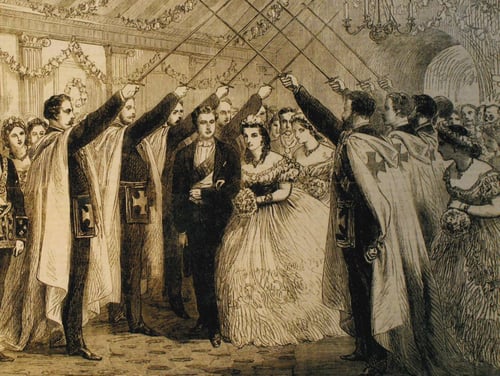 |
| The Prince and Princess of Wales at the 1863 Commemoration Ball |
During this period the Brethren presented the Lodge with a large amount of plate. The first record is in 1849 a pair of gravy spoons given by the Provincial Grand Master, a fish knife and fork by the W.M. and two salt cellars by the S.W. In the following year, a book was purchased to record these and subsequent gifts. In all this period it became customary for the Lodge to give a Ball in Commemoration Week and also to hold a Fête – or Garden Party – in one of the College gardens such as New College or St John's. The great occasion was in 1863. The W.M. was asked if he had any objection to the Brethren originating a torchlight procession to celebrate the wedding of the Prince of Wales, while Bro. Lord Newry was asked to be Secretary of the Ball and Fête Committees. The cost of the Ball, £2,046, held in Christ Church, was met half by the Lodge and half by that College. The Prince and Princess of Wales duly attended. The tickets were a guinea each and no member was allowed more than five tickets. There is no record of the numbers who attended on this Gala occasion, but in 1866, 750 attended the Ball in the Clarendon Hotel and 3,212 were present at the Garden Party given in New College.
For over twenty years W. Bro. Alderman Thompson had been Treasurer. But complaint was made in 1865 that "the items of receipt were entered in the roughest and most hasty manner on loose sheets of paper" and that no proper receipts had been given for money paid. Surprise was expressed that Bro. Thompson, in the midst of his many public and other avocations, had been able to give the time and manifest the energy in the management of the Masonic Festivities and internal Lodge matters in Oxford and the Province and City were congratulated in possessing so valuable a Brother. In 1866 Bro. Thompson became Secretary instead of Treasurer and a quarrel arose over holding the Ball - which resulted in his resigning his office. The Lodge had already agreed to present him with a testimonial in recognition of his services as Treasurer. The Master reminded the Lodge that the late Secretary's misconduct ought not to obliterate the memory of his services in former years. No serious breach in the harmony of the Lodge occurred as we find Bro. Thompson in frequent attendance afterwards, taking an active part in the proceedings.
In the period 1825 to 1844, a total of 258 gentleman were initiated: an average of 14 a year. 1831 saw the largest number: thirty. Only in 1836 and 1839 were there fewer than ten initiations. During the next eight years, the annual average had risen to 24 whereas from 1853 to 1868 the average was no less than 43. In 1864, as many as 63 saw the light of Masonry through the Apollo University Lodge. Between 1825 and 1844, five Marquesses, two Earls, four Viscounts and nine Lords (Marquesses of Abercorn, Douglas, Waterford, Kildare and Blandford; Earls of Craven and Lincoln; Viscounts Folkestone, Loftus, Cantelupe and Seaham; Lords Southampton, Monson, Russell, Harrington, Boscawen, De Tabley, Charles Thynne, Leverson and Henry Loftus). By far the largest number of initiates (86) came from Christ Church, followed by University College (33) and Oriel (24). Between 1845 and 1869 among those initiated were the Earls of Lincoln, Carnarvon, Jersey and Donoughmore, Viscounts Ingestre, Fordwich, Vaughan, Hamilton, Adare and Newry; Alan, Lord Garlies, Lords Howard, Skelmersdale, Kenlis and Warkworth, the Hon. John F. Twistleton-Wykeham-Fiennes, the Hon. William Edward Sackville-West, the Hon. Alan Herbert, the Hon. Auberon Herbert, the Hon. Charles Winn and Sir George Beaumont, 9th Bt, Sir Robert Buxton, 3rd and last Bt, Sir John Marjoribanks of Lees, 3rd Bt, Sir Henry Fletcher-Vane, 4th Bt, Sir Michael Hicks Beach, 9th Bt, Sir George Macpherson-Grant, 3rd Bt, Sir Joseph Bailey, 2nd Bt, and Sir Frederick Johnstone, 8th Bt. It had been affirmed in 1853 that candidates must be, or have been, members of the University, though members of the Isaac Newton University Lodge No 859 of Cambridge, were eligible to be elected as joining members.
1870-1914
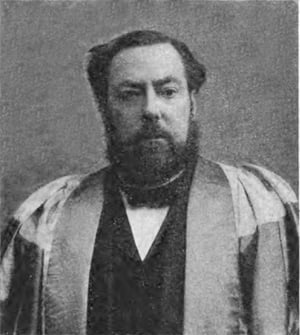 |
| Dr John Varley Roberts |
During the whole of this period, the Lodge continued to meet in its Frewin Court premises, the fourteen-year lease from the Clarendon Hotel at £100 a year being renewed periodically. Money was spent from time to time on redecoration and heating. Twice, in 1882 and 1896, consideration was given to the installation of electricity but postponed. The organ seems to have given trouble: an offer of a harp organ was made by a Brother in 1874. Four years later a sum of money was set aside to purchase new instrument and finally in 1893 at the instigation of Dr John Varley Roberts, the organist of the Lodge and of Magdalen, a second hand organ was purchased – £65 being provided by the Ball Committee for this purpose. When the organ was inaugurated by Dr Roberts in October, the minute notes that it gave 'great satisfaction'.
The Lodge provided its own cellar: an outstanding bill for wine was settled in 1872 for £65. A committee was set up in 1895 to consider improvements in dining arrangements. This resulted in agreement for the provision of wine at banquets. In 1877 it was decided that cold suppers with hot soup would be served in the summer term and a new sherry and a new champagne were to be ordered. At the end of the century a committee considered, with similar committees of the Alfred, Churchill and other Lodges, the provision of a permanent Masonic Hall in Oxford. The project however came to nothing on grounds of finance.
Throughout the whole period the Lodge subscribed to the three Masonic charities. Grants were also made for other purposes, as in 1875, to Past Master Dawson, distressed and afflicted, and in 1880 the Alms were devoted one evening to a 'distressed Brother'. In 1887, ten guineas was voted to the Truro Cathedral Fund. £40 from the profits of the Fête and Ball in 1899 were given for the widows and families of soldiers and sailors in the South African war. But in 1897 a proposal to make a grant of £5 from the Charity Box to the Indian Famine Fund was withdrawn. Every year one or more Brethren agreed in Lodge to act as Stewards for one or other of the Festivals.
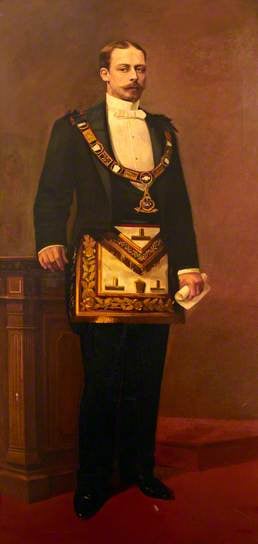 |
| H.R.H. Prince Leopold, Prov. G.M. 1876-1884 |
At its regular meeting in November 1872 'the Secretary read the names of the Brethren who were eligible for the office of W.M. and the ballot was then taken and H.R.H. the Prince of Wales was unanimously elected.' He had been elected an Honorary member that spring. He was however never installed, nor is his presence in the Lodge recorded. On March 13 1873 however, at an adjourned meeting, the fifty-fourth Anniversary Festival was held, when the chair was taken in the Second Degree by Bro. Aeneas J. MacIntyre, Grand Registrar in charge of the Province, when the Immediate Past Master, Bro. Reginald Bird, was duly installed as Worshipful Deputy Master by a board of eight installed masters. A more active member of the Royal House, Prince Leopold, of Christ Church, was proposed for initiation in April 1874 on behalf of the Prince of Wales, Past Grand Master. With R.H. Collins, the Prince was initiated that May. Robert Hawthorne Collins, born in 1841, had matriculated from Balliol in 1859, became a scholar of Lincoln in 1860, and was called to the Bar by Lincoln's Inn in 1866. He was Prince Leopold's tutor, comptroller of his Household 1874-84 and to the Duchess from 1884 when he was created K.C.B. In November 1874, the necessary officers, by permission of the Acting Provincial Grand Master at the special request of H.R.H. Prince Leopold, adjourned to Wykeham House where the Prince and Bro. Collins were passed to the degree of Fellow Craft. They were both Raised in the Lodge on 17 April 1875, when Prince Leopold was invested as Senior Warden, and Bro. Collins as Steward.
On 8 June 1875, the Lodge was honoured by the presence of Prince Arthur, Duke of Connaught and Strathearn (later Grand Master 1901-1939), who offered to the W.M. and Brethren the hearty good wishes of the Prince of Wales' Lodge No. 259, and by Bro. Major Pickard V.C., who tendered those of the Friends in Council No. 1383. Prince Leopold as Senior Warden was Secretary of the Ball and Fête Committees in 1875 and was able to report that both events had proved a great success. The Ball was attended by 218 ladies and 219 gentlemen. Expenses amounted to £513 and receipts to £551. The Fête was held in New College gardens, where the company was regaled with the Orpheus Glee Union and the band of the Coldstream Guards. The profit came to £60 of which £17 was spent on Lodge decorations and £10 sent to the Radcliffe Infirmary.
There was an especially magnificent occasion in 1883 when the Ball was held in the new Examination Schools and was graced by the presence of Prince Leopold, the new Provincial Grand Master – now the Duke of Albany – and his Duchess. 249 gentleman and 243 ladies were then present. The tickets cost 12s 6d each. Generally the Ball made a small profit but apparently it suffered from the emergence of College Balls. Thus in 1899 no Ball took place 'owing to the many College Balls'. As well as the Fête, a Garden Party continued to be held on the Wednesday in Commemoration Week in various College gardens (St John's, New College, Wadham). Attendance varied from about 1600 to 2000 persons and often profits came to over £100, but that in 1894 was a disaster as rain poured down all day. Today the Vice-Chancellor's Encaenia Garden Party has taken the place of this pleasing social function in the University from the Apollo University Lodge.
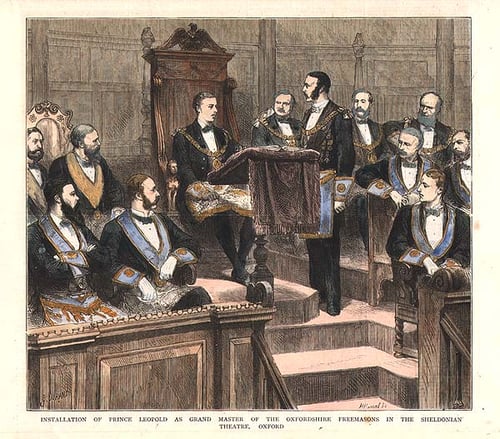 |
| Installation of Prince Leopold as Provincial Grand Master, Sheldonian Theatre |
On 22 February 1876, Prince Leopold was installed as Worshipful Master in the presence of a large company including many distinguished former members of the Lodge: Lord de Tabley, Provincial Grand Master Cheshire; Lord Shrewsbury, P.G.M. Staffs.; Lord Methuen P.G.M. Wilts.; Col. Burdett, P.G.M. Middlesex; and Colonel Campbell, P.G.M. East Renfrew. The following day, Prince Leopold was installed as Provincial Grand Master for Oxfordshire in the Sheldonian Theatre by Lord Skelmersdale, Deputy Grand Master, who, when up at Christ Church, had been initiated in the Apollo University Lodge in May 1856. The Lodge voted 25 guineas as its share of the expenses on that occasion. The Prince had attended the Lodge with great regularity when Senior Warden in 1875-6. He now, on 19 June 1876, initiated Mr Pollexfen Copleston Colmore Radcliffe 'this being the first occasion of His Royal Highness performing a ceremony as Master of the Apollo Lodge'. In 1880 the Prince presided over the Girls' Festival and the Lodge subscribed £10. He was congratulated on his engagement the following year, but to the great sorrow of the Lodge he died as a young man in 1884.
In 1897 Lord Valentia, Deputy Provincial Grand Master, installed the Master-elect. In 1904, the Grand Secretary, Sir E. Letchworth, installed Bro. A.C. Carter. On 11 March that year, the Rt Hon. Bro. T.F. Halsey M.P., Deputy Grand Master of England, and R.W. Bro. the Earl of Jersey, Provincial Grand Master were present when Bro. Halsey initiated his son, Gavin George of Magdalen, and four other candidates. He had previously initiated his elder son, Walter. Bro. Halsey said that he had ruled over Hertfordshire for thirty years and was the first commoner to be made Deputy Grand Master since the Union. Three generations of his family had been initiated into Apollo. Halsey was again present on 14th February 1911 on the occasion of the 50th anniversary of his initiation. Lord Ampthill, the Pro. Grand Master, another old Apollo man, also honoured the lodge. Halsey gave the charge to the Initiates. At the Banquet at the Randolph at which 95 sat down, he was presented with a silver cup, a replica of one of the old Oxford cups, suitably engraved. Bro. Halsey, in reply to his toast, alluded to the fact that his father had been initiated in the Lodge and that he had also had 4 sons initiated there, two of whom were present that evening.
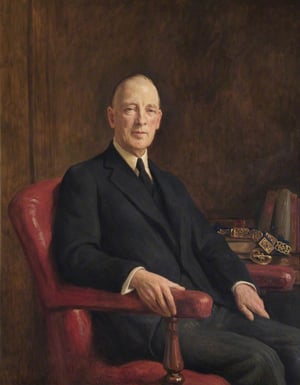 |
| Sir Philip Colville Smith CVO, G. Sec. 1917-1937 |
On one occasion there was a curious and seemingly unpleasant incident. Philip Colville Smith, who was to become Grand Secretary, had been Master in 1891 and 1893. He was appointed Secretary in 1895. He was again elected as W.M. for 1896. At the Festival Meeting on 11 February, after the Minutes were read, Past Master Bro. Pickard proposed the omission of the paragraph relating to the election of Bro. Colville Smith as W.M. for the ensuing year. Bro. Pickard, a Student of Christ Church until 1868, had become an Inspector of Schools in 1864. His motion was seconded by Bro. le Strange. A long discussion ensued, the Lodge being addressed by Bro. Pigott, Bro. Davies (J.D.), Bro. Morrell (P.M.), Bro. Stride, and Bro. Pope (P.M.). Bro. Pickard replied and asked leave to withdraw his motion. This was agreed to by the Seconder. Bro. Colville Smith was duly installed. At the next Lodge meeting Bro. Pope proposed 'that the Brethren of the Lodge desire to express their full confidence in the W.M. and to assure him of the loyal and hearty satisfaction with which they view his occupation of the chair'. This was seconded by the Senior Warden 'on behalf of himself and the junior brethren'. This was put by Bro. Pope and carried by acclamation. The W.M. expressed his thanks to the Brethren. But the following April, a letter was read from Bro. le Strange of Exeter College resigning his membership of the Lodge and stating his reasons. Any ill feeling, however, seems to have been of short duration, for in October that year, W. Bro. Colville Smith proposed and the S.W. seconded the election of Bro. Austen le Strange of Exeter College and the Philanthropic Lodge No 107 as a rejoining member.
We know little of the ritual side of the Lodge's work. A Lodge of Instruction was formed in October 1874 and at its meeting the following April we read that 'the ceremony of the Initiation of Bro. Crosse, which had been interrupted at the last regular Lodge by his having been found in possession of m...s... [that is, his preparation for Initiation had been incomplete] at the usual time for testing the same, had been so far repeated and afterwards duly completed'. Two Brethren failed to satisfy the W.M. before Raising in 1875 and were subsequently privately examined.
In April 1902 a letter was read from a Brother Silberauer stating that he had, on behalf of the Apollo Lodge, placed a wreath on the bier of Bro. Cecil John Rhodes. Rhodes had been Initiated into the Apollo University Lodge in 1877 and was elected an Honorary Member ten years later. Subsequently this brother presented to the Lodge the masonic apron which had been deposited on the bier. Throughout this period of 46 years no fewer than 1,271 gentlemen were initiated, an average of 28 a year. They included the Earl of Onslow (1871), the Earl of Antrim (1872), Oscar Wilde (1875), the Hon. Hugh Carteris (1877), Lord Walter Charles Gordon Lennox (1885), L.E. Sackville-West (1886), Oliver Arthur Villiers, Lord Ampthill, the Hon. Montague Charles Eliot (1890), George Robert Child, Viscount Helmsby and the Earl of Antrim (1899), Viscount Maidstone and Lord Eliot (1905), Lord Congelton (1920), the Hon. George Harris and Lord Rodney (1911). A number of Indian members of the University were from time to time initiated. The earliest were two Balliol men in 1883.
These great numbers inevitably led to many exclusions. On going down a number of Brethren failed to continue their subscriptions. Drastic steps were taken in October 1880 when arrears due to the Lodge amounted to £1,046. 197 circulars were sent out. 34 Brethren sent £110. Six were returned through the Dead Letter Office. Some promised to pay later, but five refused to pay including the Earl of Onslow. No less than 128 did not answer. In consequence the five were excluded the following year. In 1882, a further 27 were excluded including the Earl of Antrim. In 1888, 79 exclusions were made, and nine in 1891, and 13 in 1893. On later occasions, too, the number of exclusions has been large. In this, as in other respects, perhaps the nature of undergraduates changes little.
1914-1969
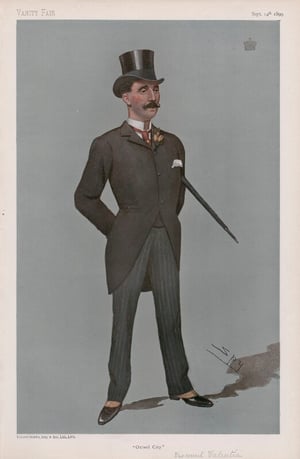 |
| 11th Viscount Valentia, Prov. G.M. 1914-1927 |
On the eve of the First War, the Lodge held, as generally had been the custom, its Commemoration Ball – destined to be the last. It had welcomed the appointment of Lord Valentia, who was not, however, installed until May 1915, as Provincial Grand Master in succession to Lord Jersey. Then the curtain fell on the normal activities of the Lodge. Early on, a telegram was received from Buckingham Palace requesting a subscription from the Lodge to the Prince of Wales' Fund for the relief of war distress. The Lodge gave twenty one guineas. The City Lodges lost their home in the High Street where the Masonic premises were used with the Examination Schools as a war hospital. They were accorded all facilities by Apollo to carry on their labours in the Frewin Court building at a charge of two guineas a night for Lodge meetings and one guinea for the Royal Arch and Rose Croix Chapter meetings. During the war years, no candidates came forward for Initiation, though the Lodge met regularly for formal business and dined afterwards in the Senior Common Rooms of different Colleges.
The only Master of the Lodge to have died in office was W. Bro. Mackworth, who passed away suddenly in December 1917. In 1918, Colville Smith had been appointed Grand Secretary and was presented by the Lodge with a piece of plate and a cheque for £55. In the same year the Rev. T.T. Blockley was presented with his full dress regalia on his promotion as Grand Chaplain. A year after the end of the war – on Thursday November 13 1919 – V.W. Bro. Colville Smith was installed as Master at the Centenary Meeting of the Lodge held by dispensation in the Town Hall. W. Bro. Dr Proudfoot, subsequently Grand Superintendent of the Province, was in the chair, the Earl of Jersey was Senior Warden and Bro. A.D. Burnett Brown, Junior Warden. After the Lodge was opened, the Pro Grand Master, Lord Ampthill, accompanied by R.E. Baynes, who had been Master in 1856, entered in due form and were saluted. Lord Ampthill assumed the chair and installed Bro. Colville Smith as Master. Later that month, the first three of the post war Initiates were introduced to the Lodge. In January 1920, one of four Initiates was John Molesworth St. Aubyn, a collateral descendant of one of the Founders.
The Lodge was entering a period of rapid growth, presumably because of the large influx of ex-service men. In 1920, no less than 57 members of the University were initiated, and in 1921 the number was 51. These were indeed peak years. Thereafter except in 1922 and 1925 when 36 initiates saw the Masonic Light in 357, the numbers were generally well under 20, but in the period between the two wars 509 initiations took place – an average of around 26 a year. There is little to report in this period. 150 guineas were sent to the Million Memorial Fund in 1922. By the Festival in 1925, £750 had been sent up by members of the Lodge, an average of nearly £3 a head. The Provincial Grand Master had expressed a wish that the Province would respond to the extent of £2 a head. In 1925, congratulations were offered by the Worshipful Master to Bro. Colville Smith on his Knighthood. In that year a crisis in the Lodge arose as the Trust Houses Ltd., the owners of the Clarendon Hotel, gave notice that they would not renew the lease to the Lodge of the Frewin Court Premises. On 20 February 1926, the last meeting there was held when the Secretary reported that over 2000 masons had been initiated there since February 1865.
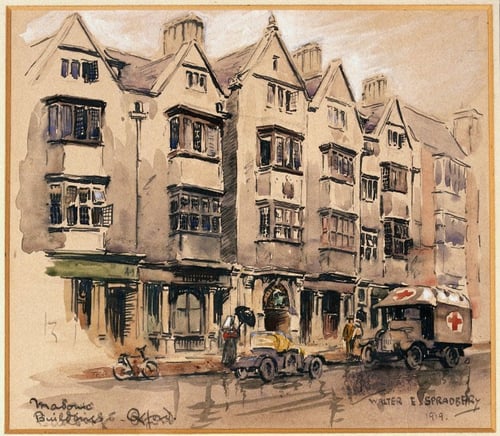 |
| Former Masonic Building, High Street, Oxford |
For the next two meetings, the Assembly Room in the Town Hall was engaged. But the Lodge settled down in the Masonic Temple in the High Street, owned jointly by the Alfred and Bertie Lodges. Dinners were held, as they had been for some time, in the Randolph Hotel. The Lodge mourned the passing of one of its most distinguished and active Brethren in the person of Sir Frederick Halsey P.C., Past Deputy Grand Master, in 1927 and in March the following year of a recent Past Master, Bro. Murray Wrong, of Magdalen. In 1936 the Lodge learnt with great regret that its beloved Secretary, Bro. Colville Smith, who the previous year had again been Master to celebrate his jubilee, was in the Royal Masonic Hospital where he underwent a major operation. He never really recovered and the following year he was no more. And so had passed away a remarkable character who had been the life and soul of the Lodge for over fifty years. Although a very active Grand Secretary he kept rooms in High Street and was in effective control of all the University Masonic bodies. He was succeeded as Secretary by Past Master Patrick Johnson, Fellow of Magdalen and Treasurer of the University Boat Club. Unfortunately the Second World War soon engrossed his attention and he was compelled to leave the direction of the affairs of the Lodge to the Assistant Secretary, Bro. Clive Saxton.
At the outbreak of the Second World War, at the request of the Government, who feared major disasters from bombing, the Lodge meetings were suspended. The premises in the High Street were again requisitioned for hospital purposes. But in March 1940, a meeting was held in the Congregational Church School Room in the Cowley Road when an informal discussion took place on the affairs of the Lodge and the continuance of Lodge activities during the war. In May that year a meeting was held at which the Deputy Provincial Grand Master was present and a brother Passed to the Second Degree. The Lodge continued to meet there from time to time for the election and Installation of a Master, until in January 1942 two gentlemen were Initiated. At the following meeting in February, there were three Initiates. In October 1942, arrangements were made to meet in Magdalen College, when two more Initiates were introduced. The new President of that College, Tizard, rejoined as a member of the Lodge which continued to meet there very happily until March 1946. During this period the lodge was honoured by a visit from the Grand Master, M.W. Bro. Lord Harewood, in October 1943. In May 1945, the Lodge voted two hundred guineas to the Boys' Festival over which the Provincial Grand Master presided that year. During the latter part of the 1946, the Lodge meet once again in the Congregational Church School and then at the Randolph Hotel. But from February 1947, it returned to the Masonic premises in the High Street.
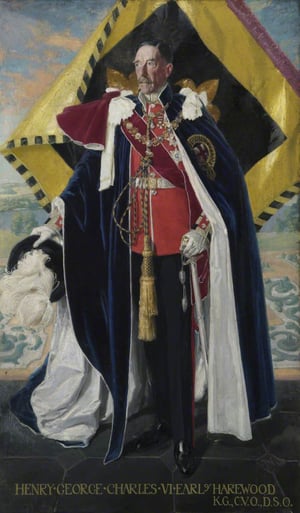 |
| 6th Earl of Harewood, Grand Master 1942-1947 |
During the war period the Brethren had worn lounge suits for the Lodge meetings. Now, however, in 1947, a recent communication from Grand Lodge had suggested that Lodges might wish to resume the custom of wearing evening dress. This, Apollo forthwith did. But it was not until the Installation meeting of 1959, thanks to the kind offices of Worshipful Brother Lesser of Reading that the officers were equipped with knee breeches. In 1947, the Lodge once again received a visit from the Master and Officers of the Westminster and Keystone Lodge No 10, with which for so many years it had retained close fraternal links. At the Festival that year, the Lodge was honoured by the presence of the Provincial Grand Master R.W. Bro. T.T. Blockley (who was soon to retire), the Deputy, Bro. Col. Wingfield, the Grand Secretary, Bro. Sidney White and the Grand Director of Ceremonies, Colonel Bull. R.W. Bro Harry Crookshank P.C. was also present. The Grand Secretary installed the Master-Elect, Bro. Rev. R.L.P. Milburn, Fellow of Worcester College.
In subsequent years, the Lodge was frequently visited by the new Provincial Grand Master, Col. G.D. Amery, another Past Master of the Lodge, whose foresight and enthusiasm was largely responsible for settling the Lodges of Oxford, including Apollo, in a new home in North Oxford. The Provincial Grand Secretary informed the Lodge of the project, and it was agreed to transfer the balance outstanding to the credit of the old Ball account, of £316 13s 9d, to a Building Fund. However the Secretary, W. Bro. Clive Saxton, disagreed with the policy being pursued and submitted a report on his resignation as the Lodge Representative on the Board of Directors of the Oxford Masonic Hall Company on 7 July 1953. In consequence, the Lodge established a committee to consider the subject so that guidance could be given to the Brethren. In February 1954 the Committee informed the Lodge that it had just completed its report, and the W.M., Bro. Leo Clark, gave notice that at the next meeting he would propose the adoption of its recommendations. The Secretary was of opinion that such notice was premature. After a long discussion, Bro. Milburn proposed the adoption of the Committee's report, advocating that Apollo should join in the new building scheme. Bros J.W. Stubbs and A.D. Burnett-Brown supported this action. Bro. R.L. Lowe, supported the Secretary who moved an amendment to the effect that the Lodge retain its Ball Committee funds and that individuals who had already subscribed be asked whether they preferred their gifts to be retained by the Lodge or given to the Masonic Hall Company. The Secretary's amendment was lost by 19 votes to 15. The main resolution was then carried by 20 votes to 8. It was then agreed to hand over the Provincial Grand Treasurer the sum standing to the credit of the Lodge Building Fund and the old Ball Fund and that the Lodge appoint a brother as a director of the Company. It was subsequently announced that all subscribers had agreed to pass their donations to the Provincial Building Fund except the Secretary, who withdrew his donation of 100 guineas, which he sent instead in equal parts to the R.M.I.B. and the Masonic Hospital. In November, W. Bro. J.G. Griffith was elected as Representative Director of the Masonic Hall Company.
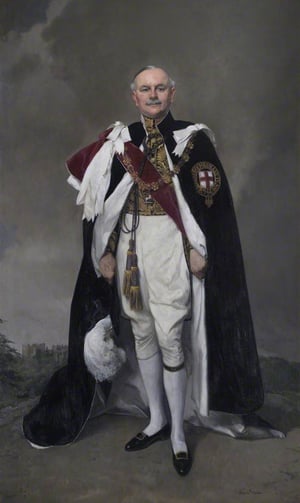 |
| 11th Earl Of Scarbrough, Grand Master 1951-1967 |
On 29 January 1955, The Grand Master, Most Worshipful Brother Lord Scarborough (who had been initiated into the Lodge in 1923), honoured the Lodge with his presence on the occasion of the Initiation of his heir, Lord Lumley. Later that year, the Lodge was in mourning for the death of the Provincial Grand Master, Col. Amery who was succeeded by another Apollo member, Lord Rathcreedan. In 1956, the Lodge was again host to the W.M. and Brethren of No. 10 and the Master-elect and Brethren of the Isaac Newton University Lodge. The Lodge gave £25 to Magdalen College on the occasion of their quincentenary as a token of appreciation for the hospitality of the Lodge during the war years. In 1958 Bro. Clive Saxton ceased to be Secretary. Bro. Bownas, Worshipful Master, paid a graceful tribute to Bro. Saxton who was prevented by illness from being present. The Lodge, he said, owed much to his untiring energy and the high efficiency with which he had carried out the duties of Secretary for the last 21 years. The Provincial Grand Master wrote in similar terms expressing the appreciation of the Province for his undoubted zeal and loyalty to Apollo.
In 1959, plans for a building a new Temple at 333 Banbury Road were available for inspection. It was completed at the end of 1961 when the Installation Meeting of the Lodge was held for the first time in the new Oxford Freemasons' Hall. At this time, too, a Lodge Committee, which had been in abeyance, was reconstituted. It consisted of the W.M., the I.P.M., Treasurer, Secretary, the two Wardens, the two Deacons and two Past Masters, of whom one was to be non-resident. In due course, this new By-law received approval of the Provincial Grand Master and of the Grand Master. In 1960 the financial affairs of the Lodge were explained by the Treasurer. Owing to the exceptional circumstances, the relevant information had only just been received. The accounts for the two years, 1958 and 1959 were then accepted. It was decided in future to have both an income and expenditure account and a balance sheet. The dining and general accounts were to be merged as had been customary until a few years back. By June 1960 the Lodge had subscribed £3,500 to the Building Fund. In 1961 the Lodge was the grateful recipient of two welcome gifts. W.Bro. Sir George Cooper P.G.D. left two Dresden Porcelain figures of masonic interest to the Lodge, and £2000 was gratefully received from the executors of W.Bro. Dr Cartwright, P.G.D. Subsequently, a cabinet to hold the Lodge's objects was purchased for £40.
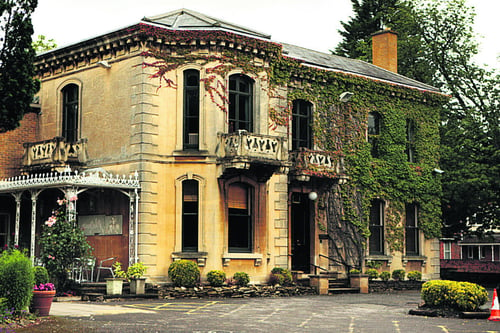 |
| Former Oxford Masonic Centre, 333 Banbury Road |
The new form of obligation recently sanctioned by Grand Lodge was used first in January 1965. At the end of the year, Lord Rathcreedan, Provincial Grand Master, attended to mark the 10th year of his reign and the 40th of his Initiation into the Lodge, as well as his 60th birthday. During 1966, the Lodge was busily engaged in collecting covenants and stewardships for the 1967 Festival of the Royal Masonic Institution for Girls. Eventually, over £3000 was realised. Lord Donoughmore, the Most Worshipful Grand Master of Ireland, and Most Worshipful Brother Sir Malcolm Barclay Harvey, Past Grand Master Mason of Scotland were elected Honorary Members as had been Bro. Major R.L. Loyd and Lord Scarborough, all of whom had been initiated into Apollo. In May 1968, the Lodge was honoured with a visit from the Grand Master of Ireland accompanied by his Deputy, Bro. J.A. Wallace and his Secretary, Bro. J. Harte. Besides the Provincial Grand Master of Gloucestershire, Bro. Bathurst, of Buckinghamshire, Bro. Howard Potts, two Past Grand Wardens, Lt.-Gen. Williams and Major-General Hone, the Grand Secretary, and twelve other Grand officers. Copies of the Oxford Ritual were presented to our Irish visitors. The Lodge mourned the death of one of its distinguished initiates in 1969: Most Worshipful Brother Lord Scarborough, Past Grand Master and Pro. Grand Master. At the close of that year was held the 150th Anniversary Festival, when V.W. Bro. Dr Costin was installed by R.W. Bro. Stubbs, Grand Secretary, as Master for the fifth time in the presence of the Provincial Grand Master, Lord Rathcreedan, the Provincial Grand Master for Somerset, R.W. Bro. Sir Lionel Brett, Past District Grand Master for Nigeria, and fourteen other Grand Officers. On this occasion it was announced that in May, the Lodge would hold a special meeting to commemorate its continuing existence for 150 years.
Today
In many ways the University has changed fundamentally in numbers and types of undergraduates; so, too, has the Lodge. No longer is it the premier social club of the University, but the abiding tenets of the Craft are still taught and held, and the ancient landmarks through all vicissitudes have remained unchanged. And so may the Lodge which has initiated more than 4500 Brethren go on to set an example to future generations of the fundamental principles of Brotherly Love, Relief and Truth.
©2025 Apollo University Lodge